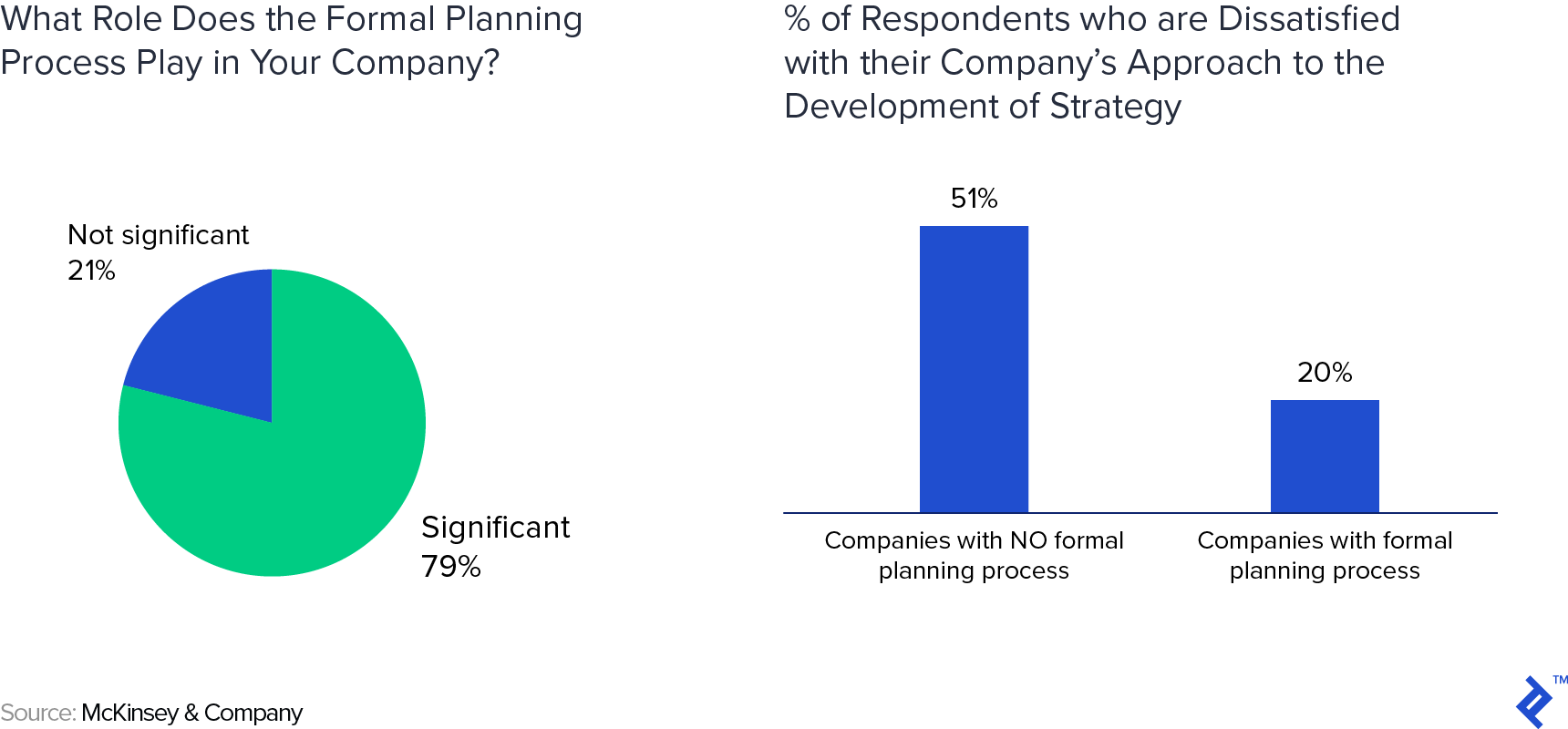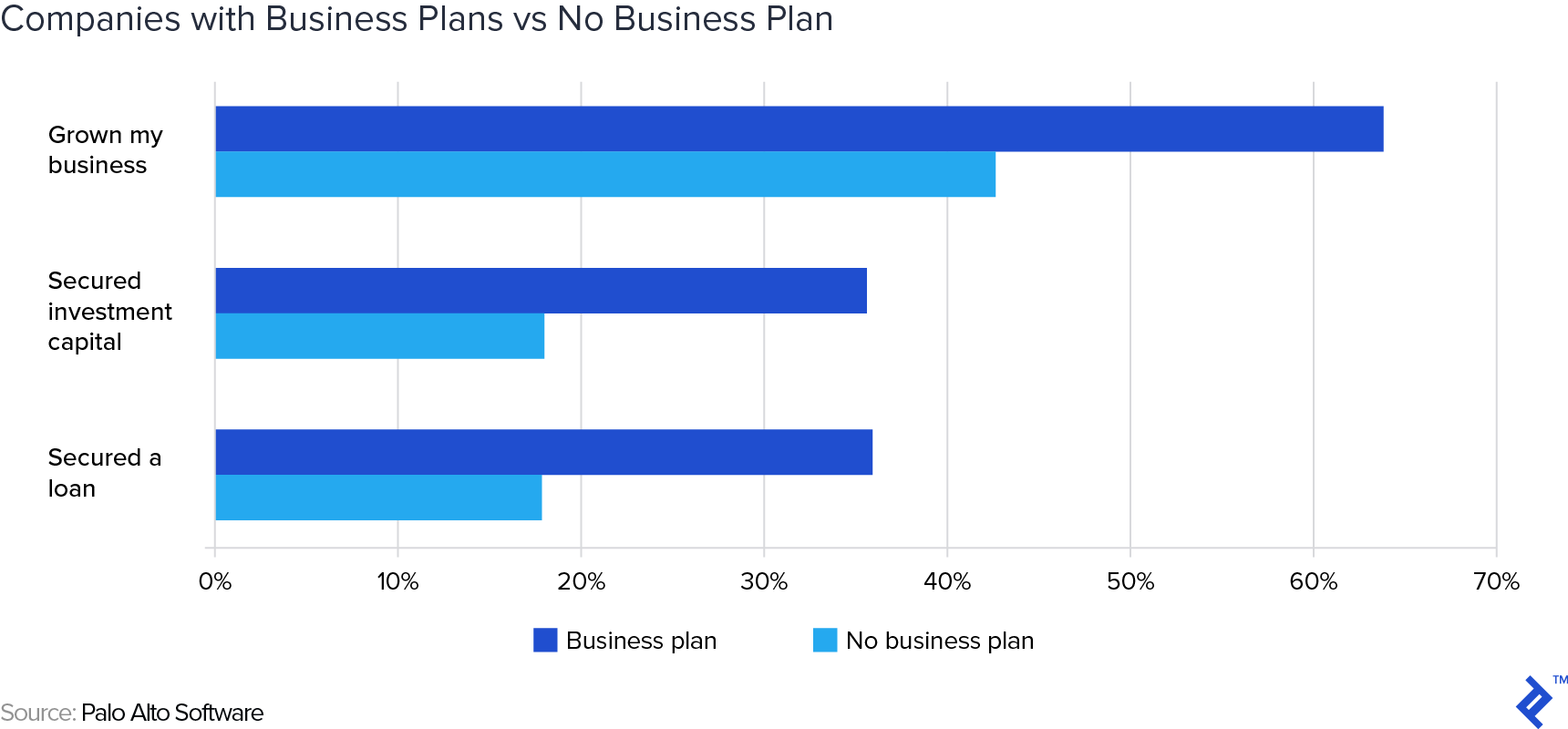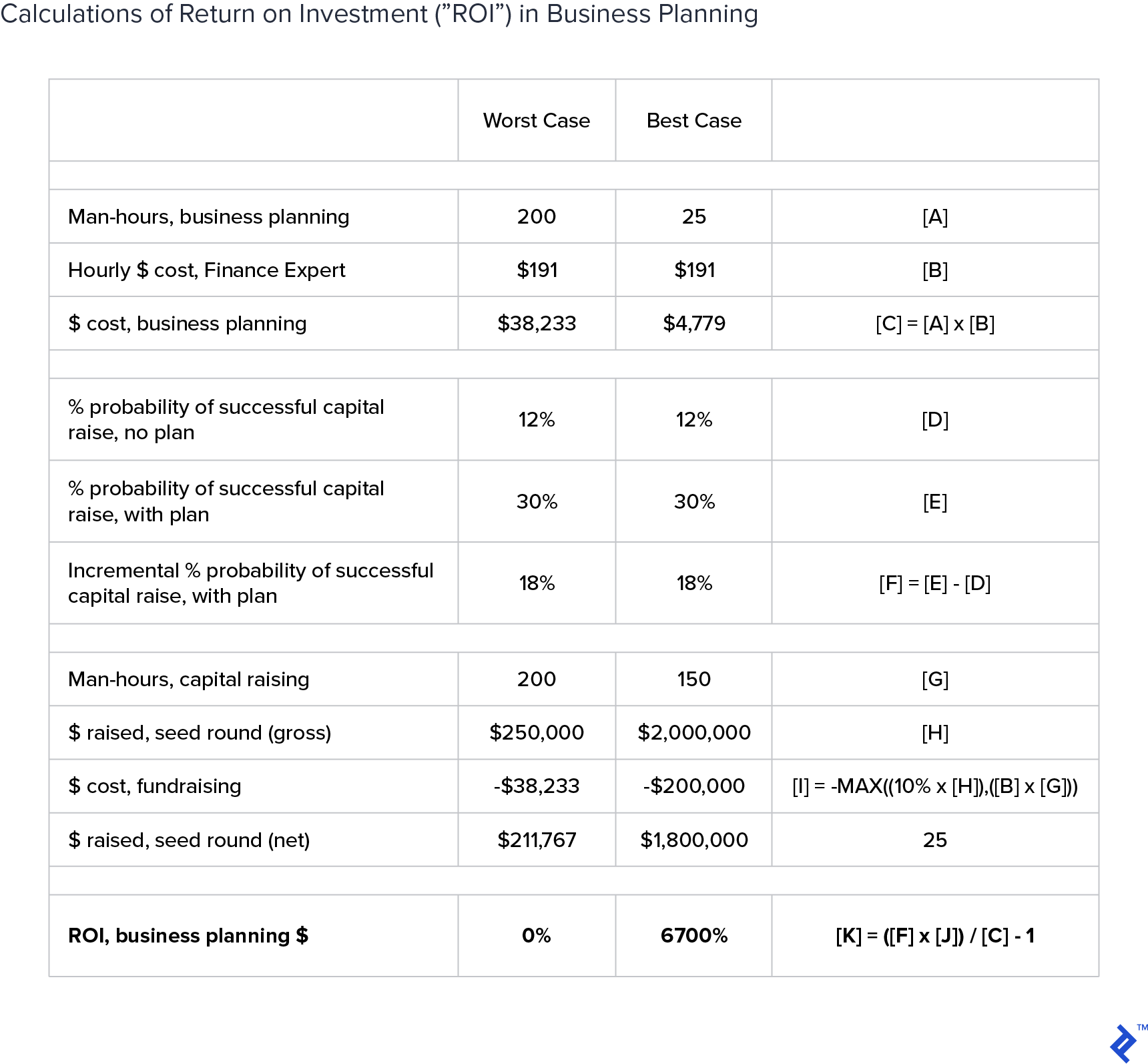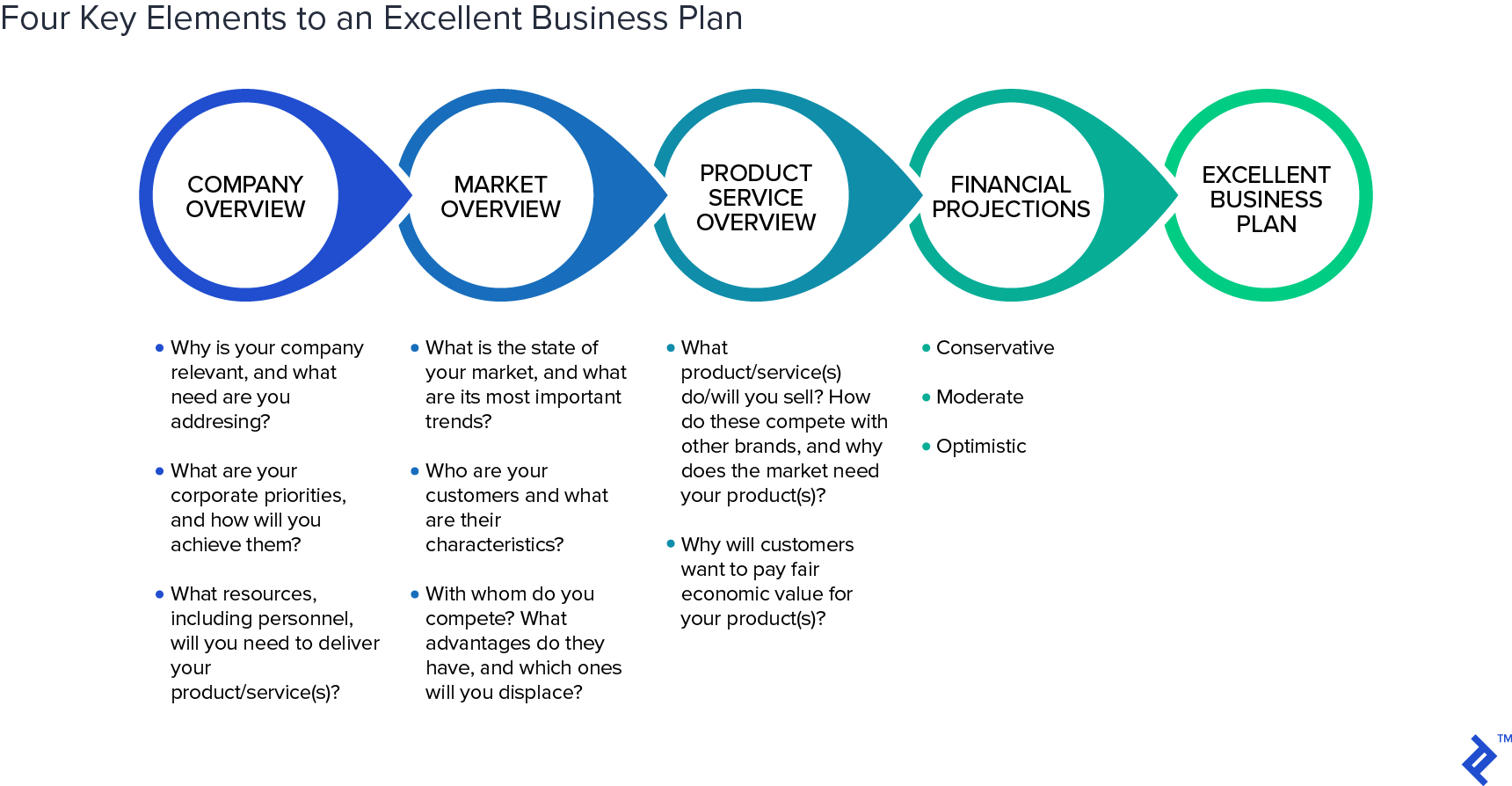We often hear about business plans in the context of early-stage companies; however, constructing excellent business plans is difficult and time-consuming, so many entrepreneurs avoid them. But, is this a mistake?
While most people may be aware of the “soft” arguments for and against writing a business plan, in this article, a Toptal Finance Expert takes a data-driven approach to addressing the debate. In it, he finds strong evidence to support the notion that writing an excellent business plan is time well spent.
We often hear about business plans in the context of early-stage companies, but constructing excellent business plans is difficult and time-consuming, so many entrepreneurs avoid them. That’s a mistake, as there is strong evidence demonstrating that business plans generate positive returns on time and money invested.
The business world has long debated the importance of business plans, and most involved understand the “soft” arguments. However, this article delves into the data to conclude that writing an excellent business plan is time well spent. I developed a similar view over my 20+ year financial career, during which I have analyzed well over 10,000 different types of companies. I have noticed that while a business plan may not be required for a venture to become successful, having one does seem to greatly improve the probability of successful outcomes.
Expert Opinions Support the Value of Business Planning
Expert opinions support the four following conclusions:
- Individuals who write business plans are 2.5x as likely to start businesses.
- Business planning improves corporate executive satisfaction with corporate strategy development.
- Angels and venture capitalists value business plans and their financial models.
- Companies who complete business plans are 2.5x as likely to get funded.
Individuals Who Write Business Plans Are 2.5x More Likely to Become Entrepreneurs
Many people have business ideas over the course of their careers, but often, these ideas never come to fruition, or they get lost amidst our daily obligations. Interestingly, studies support the notion that those who write business plans are far more likely to launch their companies. Data from the Panal Study of Entrepreneurial Dynamics in fact suggests that business planners were 2.5x as likely to get into business. The study, which surveyed more than 800 people across the United States who were in the process of starting businesses, therefore concluded that “writing a plan greatly increased the chances that a person would actually go into business.”
Of course, causation of this phenomenon is hard to pin down. There are several different possible reasons why this correlation between writing business plans and actually starting a business may exist. But William Gartner, Clemson University Entrepreneurship Professor and author of the Panal Study, believes that “‘research shows that business plans are all about walking the walk. People who write business plans also do more stuff.’ And doing more stuff, such as researching markets and preparing projections, increases the chances an entrepreneur will follow through.”
Research shows that business plans are all about walking the walk. People who write business plans also do more stuff. And doing more stuff, such as researching markets and preparing projections, increases the chances an entrepreneur will follow through.
William Bygrave, a professor emeritus at Babson College, reached a similar conclusion despite having previously shown “that entrepreneurs who began with formal plans had no greater success than those who started without them.” Bygrave does admit, however, that “40% of Babson students who have taken the college’s business plan writing course go on to start businesses after graduation, twice the rate of those who didn’t study plan writing.”
Business Planning Improves Corporate Executive Satisfaction
Another important way in which business plans can provide tangible help is by aligning everyone in an organization with the vision and strategy going forward. And this, in turn, has important ramifications on corporate executive satisfaction. A study by McKinsey & Company which surveyed nearly 800 corporate executives across a range of industries confirms this conclusion. In it, McKinsey found that “formal strategic-planning processes play an important role in improving overall satisfaction with strategy development. That role can be seen in the responses of the 79 percent of managers who claimed that the formal planning process played a significant role in developing strategies and were satisfied with the approach of their companies, compared with only 21 percent of the respondents who felt that the process did not play a significant role. Looked at another way, 51% of the respondents whose companies had no formal process were dissatisfied with their approach to the development of strategy, against only 20% of those at companies with a formal process.”

Of course, not all planning is equal. Planning just for the sake of planning doesn’t have the desired effects. As McKinsey itself noted in their study, “Just 45% of the respondents said they were satisfied with the strategic planning process. Moreover, only 23% indicated that major strategic decisions were made within its confines. Given these results, managers might well be tempted to jettison the planning process altogether.” As such, entrepreneurs and business managers should take the time and effort required to put together a well-written and well-researched business plan. Later in the article, I outline some of the elements of a well-written plan.
Business Plans and Their Financial Models Are Valuable to Angels and Venture Capitalists
Many entrepreneurs will eventually need to raise outside capital to grow and develop their businesses. In my experience, a business plan is a crucial tool in maximizing the chances of raising money from external investors. A well-written plan not only helps investors understand your business and your vision, but also shows them that you’ve taken the time to carefully assess and think through the issues your business will face, as well as the more detailed questions surrounding the economics and fundamentals of your business model.
Nathan Beckford, CFA, is the CEO of FounderSuite, the funding stack used by startups in Y Combinator, TechStars, 500s, and more to raise over $750 million. Nathan illustrates the above point nicely in an email he wrote to me recently: “Prior to starting Foundersuite.com, I ran a startup consulting business called VentureArchetypes.com. For the first few years, our primary business was cranking out bold, bullish, beautifully-written business plans for startups to present to investors. Around the mid-2000s, business plans started to go out of favor as the ‘Lean Startup’ methodology became popular. Instead of a written plan, we saw a huge uptick in demand for detailed financial models. Bottom line, I still see value in taking time to be contemplative and strategic before launching a startup. Does that need to be in the form of a 40-page written document? No. But if that’s the format that best works for you, and it can help you model scenarios and ‘see around the corner’ then that’s valuable.”
Nathan and I have frequently interacted, as I maintain a subscription to FounderSuite, software I use when running capital campaigns for early-stage companies on whose boards I sit, or when raising capital for my own firm’s investment projects. Nathan’s feedback is helpful, as he frequently interacts with thousands of entrepreneurs simultaneously running capital campaigns, providing him with a great perspective on which approaches work and which don’t. Clearly, he sees that financial models and business plans in some form help entrepreneurs raise capital.
Companies Who Complete Business Plans Are 2.5x as Likely to Get Funded
Following the section above, naturally, if business plans are useful to outside investors, these are therefore likely to also increase one’s chances of successfully raising capital. A study by Palo Alto Software confirms this hypothesis. The study showed that although 65% of entrepreneurs had NOT completed business plans, the ones who had were twice as likely to have secured funding for their businesses.

This study surveyed 2,877 entrepreneurs. Of those, 995 had completed business plans, with 297 of them (30%) having secured loans, 280 of them (28%) having secured investment capital, and 499 of them (50%) having grown their businesses. Contrast these percentages with the results for the 1,882 entrepreneurs who had not completed business plans, where just 222 of them (12%) had secured loans, 219 of them (12%) had secured investment capital, and 501 of them (27%) had grown their businesses. (Note that the percentages among the business plan population sum to over 100% because of some overlap between each of the sub-categories.) These results led the study authors to conclude that “Except in a small number of cases, business planning appeared to be positively correlated with business success as measured by our variables. While our analysis cannot say that completing a business plan will lead to success, it does indicate that the type of entrepreneur who completes a business plan is also more likely to run a successful business.”
Calculating the Return on Investment for Business Planning
The data and studies outlined above all serve to prove something that I have come to understand very clearly throughout my career. Nevertheless, I still often find that startups struggle with the idea of having to put together a business plan, and in particular with the option of hiring an outside professional to help them do that. As such, I quantified the ROI of such an activity, using data and numbers based on my many years of business consulting. The results of the exercise are summarized in the table at the end of the section, but there are two overarching conclusions:
- Even a small-scale early-stage company can “afford” to pay a finance expert $191 per hour both to create a business plan and to guide the capital raising process, at worst “breaking even” on the investment.
- Larger early-stage companies can expect significant returns on investments in business planning, perhaps as much as 6,700% (67x the amount of money invested).
Diving into the analysis, my inputs included:
- My professional experience with writing business plans. I have spent 25 – 200 hours apiece creating business plans I feel comfortable sharing with founders, advisors, and investors.
- Data from the Palo Alto study discussed earlier in this article. This study showed that 30% of early-stage ventures with business plans had secured funding, 2.5x as great as the 12% of early-stage ventures without business plans who managed to secure funding despite the absence of such plans.
- My professional experience with capital raising. I have spent, on average, 150 – 200 hours communicating with investors per round of financing for early-stage companies. Also, for companies using “brokers” to assist with capital raising, commissions may run as high as 10% of capital raised. For this analysis, I assumed that an early-stage company would need to spend the greater of either:
- The hourly rate for a finance expert x (150 to 200 hours) for one round of financing, OR
- 10% of the amount of capital targeted
My analysis illustrates the following:
- Early-stage companies should expect to spend $4,000 – $40,000 on business planning, including the financial modeling associated with it.
- Early-stage companies should expect to spend $30,000 – $200,000 for an initial round of financing between $250,000 and $2 million in size, resulting in net financing of $200,000 – $1.8 million.
- Even if a small-scale early-stage venture seeking just $250,000 in capital spent almost $40,000 on business planning and another almost $40,000 on capital raising, it should still expect to “break even” on a probability-weighted basis. In other words, because the odds of success with a professional business plan are 2.5x greater than without one, small-scale early-stage ventures can justify such a significant investment. This also assumes NO additional odds for success from engaging a professional to coordinate the fundraising effort. I suspect that doing so may push the odds of success from 12% without a business plan and 30% with a business plan to above 50%. It is also likely that a smaller-scale venture may require significantly fewer hours for business planning and capital raising that what is outlined in the “worst case” below.
- Larger early-stage ventures enjoy extraordinary probability-weighted returns on investment from business planning. Because the target net capital so greatly exceeds the money spent on business planning, the prospective ROI is huge, and this analysis just assumes ONE round of equity financing. Most successful startups will experience several rounds of financing.

Thoughts on Writing an Excellent Business Plan
An extensive overview of how to write an excellent business plan is beyond the scope of this article. However, here are two key thoughts that have emerged from my years of experience with startups.
First, there are four common elements to an excellent business plan. In Alan Hall’s Forbes article, “How to Build a Billion Dollar Business Plan: 10 Top Points,” he interviews Thomas Harrison, Chairman of Diversified Agency Services, an Omnicom division that has purchased “a vast number of firms,” to share his views on the key elements of a great business plan. Although each of these ten elements is essential, I reorganized the list into four broad categories:
1. Company Overview
- An explanation of why your company is relevant and the need are you addressing
- A description of corporate priorities and the processes to achieve them.
- An overview of the various resources, including the people that will be needed, to deliver what’s expected by the customer.
2. Market Overview
- A description of the state of your market and its important trends.
- A detailed description of your customers.
- A description of your current competitors and their advantages. Which ones will you displace?
3. Product/Service Overview
- A description of your products, how they compete with other brands, and why they are needed.
- An explanation of why customers will pay a fair economic value for your product or service. This element is conspicuously absent from some of today’s most expensive unicorns. Companies such as Uber and Tesla are losing massive amounts of money on rapidly growing sales because these companies may not be selling their services/products for fair economic value. Of course, sales grow rapidly when customers can buy your services/products for far less than their fair economic values!
4. Financial Projections
- Three thorough financial plans:
- Conservative
- Moderate
- Optimistic
- Each scenario should have realistic and achievable sales, margins, expenses, and profits on monthly, quarterly, and annual bases. Again, these elements appear to be conspicuously absent from some of today’s most expensive unicorns.

Second, written business plans are superior to those just “outlined.” As an adjunct professor of finance for Villanova University, I require my students to write research reports prior to developing slide decks to present their findings from a full semester of industry research. The process of writing forces the authors to ask themselves how they reached their conclusions and each of the sub-conclusions along the way because they must explain their logic to cynical readers. The written authors need to support their conclusions with facts and logic to prove that they are not “making it up” or relying upon popular “myths.” Outlined reports and outlined business plans are not generally subject to the same level of reader scrutiny. Therefore, written business plans are superior to those just “outlined.” Outlined plans are often kept on 10-12 slide decks, and the slide deck is an important tool in the capital raising process, but the written business plan that stands behind it will differentiate an entrepreneur from their seemingly infinite competition.
Parting Thoughts
Some argue that many public multi-billion-dollar companies such as Apple or Google never had formal business plans before they started, but this argument is flawed because most of these companies likely developed business plans either during the solicitation of venture capital or during the process of going public. Apple and Google were both funded with venture capital, and soliciting venture capital involves business planning. The founders of Apple and Google likely created financial projections and outlined strategic paths.
Moreover, Apple and Google are both public companies, and going public involves business planning. Underwriters employ research analysts creating financial forecasts based on business plans projected by management at the companies going public. Buy-side firms purchasing and holding shares in newly public companies create forecasts based upon the business plans projected by public company management teams.
Admittedly, you don’t need a written business plan to have a successful company. You may not even need a business plan at all to have a successful company. However, the probability of success without a business plan is much lower. Angels and venture capitalists like to know about your business plan, and public companies need to project business plans to persuade underwriters and investors to purchase their securities.




